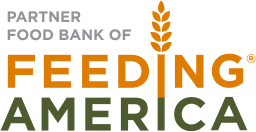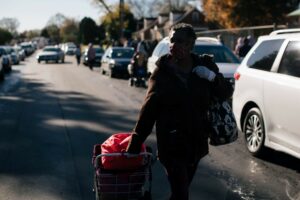Pride Month: Highlighting hunger in LGBT households
LGBT individuals face elevated rates of food insecurity compared to their straight and cisgender peers.
By Emily Gallion, Grant & Metrics Manager/Advocacy Manager, and Caitlyn McIntosh, Volunteer Support and Intake
June is Pride month, where we celebrate the LGBT community and the freedom to live life unapologetically yourself. The Foodbank values all people without judgement, and we are committed to advocacy work that strives to provide everyone with a healthy, happy, just, and safe life.
Many efforts have been made towards equality for the LGBT community, but there is still a long way to go. Like most marginalized communities, LGBT individuals are disproportionately affected by food insecurity.
One study by the Williams Institute found that 27% of LGBT individuals experienced food insecurity the previous year, compared to 17% of their straight and cisgender (the term used to describe people who are not trans) peers. Strikingly, 18% of lesbian, gay, and bisexual individuals surveyed reported that they or someone in their family went without food for an entire day in the prior month.
LGBT adults are 1.62 times more likely than non-LGBT adults, on average, to report not having enough money for the food that they or their families needed at some point in the last year.
There are disparities present within the LGBTQ community as well: a 2019 study, also by the Williams Institute, found that rates of food insecurity were highest among transgender individuals and cisgender bisexual women.
There are racial disparities present within the LGBT community as well: The 2016 study found that among LGBT individuals, 42% of African American people, 33% of Hispanic people, 32% of American Indians and Alaskan Natives, and 21% of Whites reported not having enough money for food in the past year.
Food insecurity rates were also higher among disabled people and younger LGBTQ individuals.
Cultural factors also play a large role in the food insecurity rates of LGBT individuals. A study published by Transgender Health found that the sociopolitical climate of the Southeast United States made it difficult for transgender and noncomforming individuals to find and maintain employment, which is a primary driving factor of food insecurity.
Food insecurity has many other detrimental impacts on one’s well being. Stress from unemployment and underemployment, inadequate food supplies, and discrimination was reported as a contributor to poor physical and mental health, and weakened support systems.
To offset the public health impacts of discrimination against LGBT individuals, Transgender Health recommended implementing employment nondiscrimination policies to protect trans and gender nonconforming people in the workplace. The organization also saw a need for building relationships between local food pantries and LGBT organizations to create safer environments for all persons in need of food assistance.
De’Ja Durham, MSW, is the Southern Region Program Manager for Equitas Health, an organization that offers health and other services for the LGBT community. She manages housing advocacy in Newark, Dayton, Portsmith, and Athens Ohio. Ms. Durham said she has seen clients who experience food insecurity amidst unexpected financial hardship.
“Unexpected costs not only affect mortgage, rent, but also affect affording food, toiletries, personal items, and other expenses,” Ms. Durham said. “We have a lot of clients who are homeless and are using food pantries to be able to put just a simple meal on the table.”
Among these clients, discrimination related to their LGBT identity can contribute to challenges around housing, substance abuse, and food insecurity.
“I know at least a handful of clients who are homeless due to family putting them out due to being LGBT or transgender. I know clients who have turned to substance abuse as a result of not being accepted,” Ms. Durham said. “If people don’t understand them due to the community they are a part of, or if they don’t feel comfortable attending work, they don’t have means to have income to afford food. We have a handful of clients who have told their significant other (about their LGBT identity) in the midst of their transition and may lose housing that way. They can go from being able to afford the food they need to having nothing.”
To better serve individuals in the LGBT community, Ms. Durham said that organizations should participate in bias training and training on the use of gender-affirming pronouns. Equitas Health Institute offers a variety of trainings on their website, https://equitashealthinstitute.com/.
“A lot of people have issues with saying, ‘I don’t see color,’ or ‘I don’t see gender,” Ms. Durham said. “But you should see me for who I am and accept me for who I am.”
We know that true progress towards equality cannot be done without policy and legislation change.
A study done by the Center for American Progress found that LGBT Americans receive SNAP benefits at over twice the rate of their non-LGBT counterparts. A SNAP household includes anyone living together that purchases and prepares their food together. This allows the many LGBT individuals who have a “chosen family” of loved ones that may not be related by blood to receive benefits.
Health disparities are a large concern for members of the LGBT community who are more likely to be uninsured than their counterparts. Transgender women and gay or bisexual men face higher rates of HIV than any other demographic. Medicaid expansion and access to affordable healthcare of all kinds is a life-saving measure for many LGBT Americans.
As Ms. Durham mentioned, many LGBT individuals face homelessness because of stigma and discrimination in their personal lives. Unfortunately, these individuals are widely discriminated against in some homeless shelters and rental/housing markets. Access to affordable, but most importantly safe, housing is crucial to the wellbeing of these individuals facing personal trauma.
This Pride month, and every month, we encourage you to bring those extra seats to the table for those who need it most.





No comment yet, add your voice below!